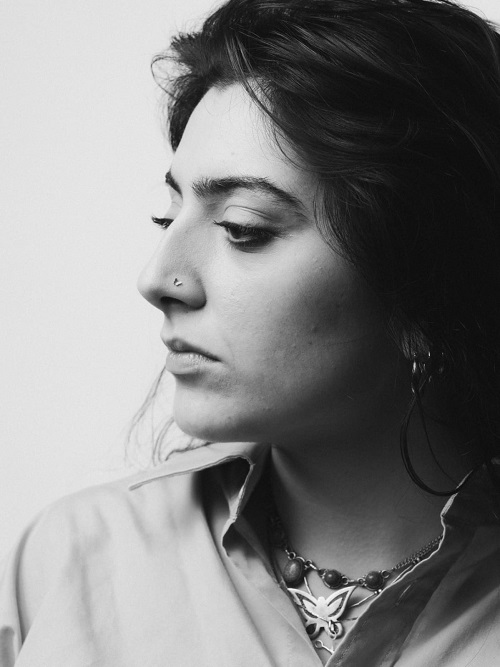FuoriCampo gallery in Siena, presents an exhibition on care, involving the spaces of the Botanical Garden of the University and Accademia dei Fisiocritici. Until July 3, 2024, a group of artists (Bora Baboci, Adam Bilardi, Enej Gala, Cecilia Granara, Julien Monnerie, Jessy Razafimandimby and Ambra Viviani), under the curatorship of Giacomo Pigliapoco, plants the seed of care. The project Sowing the seed of care brings together works about intimate relationships between humans and inanimate objects, nature and environments. Curator Giacomo Pigliapoco answers some questions to learn more about the exhibition.

AA.VV. “Sowing the seed of care”, installation view at galleria FuoriCampo, Siena © photo Ela Bialkowska OKNO studio, courtesy galleria FuoriCampo
Angelica Lucia Raho: How is the exhibition structured and how does it dialogue with the chosen places?
Giacomo Pigliapoco: Each place was selected for its symbolic meaning and its ability to amplify the themes addressed. Fuoricampo Gallery hosts the main works, creating an environment for reflection and discussion on ecology and care. The Botanical Garden, with Bora Baboci’s installation intervention, becomes a living symbol of regeneration and connection with nature, while Ambra Viviani’s intervention at the Accademia dei Fisiocritici, an institution dedicated to science and nature, invites a deep dialogue between man and animal. These two venues, historically present in the fabric of the city, express an intrinsic act of domination. Plants, taken from their natural habitats, are transplanted into the Botanical Garden, a controlled environment where growing conditions are artificially regulated. This act of control underscores the human power to manipulate and manage nature. The exotic species have been selected not only for their rarity or beauty, but also for the prestige and scientific curiosity they bring. Similarly, the animals in the Academy have been hunted, killed, and stuffed to be historically displayed as trophies, witnesses to a human superiority that does not merely observe nature, but possesses and manipulates it. As suggested by Donna Haraway, Bernard Stiegler and Manuela Macelloni, recognizing the fragility of living things and our connection to them implies an ethical responsibility. Through deeper understanding and greater awareness, we can transform these spaces of contradiction into catalysts for a new way of living in harmony with other life forms. Recognizing and accepting our “response-ability” toward all life forms is the first step in building a future where care, not domination, is at the center of the human relationship with nature.

AA.VV. “Sowing the seed of care”, installation view at galleria FuoriCampo, Siena. From left to right: Jessy Razafimandimby, “Night Special”, 2023, acrylic on board 86 x 45 x 2,7 cm; Cecilia Granata, “Whale (Love)”, 2023, acrylic, airbrush, gouache, oil on canvas, 20 x 30 cm © photo Ela Bialkowska OKNO studio, courtesy galleria FuoriCampo
Where does the title come from?
The title is an invitation to immerse ourselves in radical coexistence and the creation of networks of care, as well as in imaginative elaborations related to the environment. Seeding care means actively engaging in the protection and regeneration of our environment and relationships with other living beings, human and non-human. It is an act of awareness and responsibility that aims to build a more sustainable and harmonious future. The title reflects the need to pay attention to ecologies of care, challenging the idea that humans exist as separate individuals, and promoting a culture of interspecies care.

AA.VV. “Sowing the seed of care”, installation by Bora Baboci at Orto Botanico, Siena © photo Ela Bialkowska OKNO studio, courtesy galleria FuoriCampo
The reflection you propose focuses on the mechanisms of human domination over nature and non-human organisms. Is there also an aspect that relates, instead, to the relationship between fellow humans? Like an anthropological tendency of man toward domination over the other?
Exactly, this domination behavior is not limited only to the relationship between man and nature, but it extends to human relationships themselves. The exhibition invites us to reflect on how the culture of care and responsibility can transform not only our relationship with the environment, but also our social interactions. Promoting care means embracing an empathetic and respectful approach that recognizes the inherent value of each individual and the need to build relationships based on cooperation and mutual respect, rather than domination and oppression.

AA.VV. “Sowing the seed of care”, Ambra Viviani, “Lullaby for nonhuman animals”, 2018, installation view at Accademia dei Fisiocritici, Siena © photo Ela Bialkowska OKNO studio, courtesy galleria FuoriCampo
How do post-humanist thought and the concept of care dialogue in this exhibition?
Post-humanism challenges traditional anthropocentrism, proposing a worldview in which humanity is not at the center, but is an integral part of a complex and interdependent ecosystem. This post-humanist vision is key to promoting a culture of care, which recognizes the importance of all life and the need to act with responsibility and love toward the environment and other living things. The works explore these ideas through sound installations, sculptures, drawings and paintings, creating a space for reflection and dialogue that encourages visitors to reconsider their role in the world and engage in practices of care and regeneration. By embracing care as a guiding principle, we can hope to create a future in which humanity and other living creatures can thrive together in harmony.
Info:
VV. AA. Sowing the seed of care
curated by Giacomo Pigliapoco
28/05 – 3/07/2024
FuoriCampo
Via dei Termini 44, Siena
Museo Storia Naturale dell’Accademia dei Fisiocritici
Piazzetta Silvio Gigli 2, Siena
Orto Botanico dell’Università di Siena (SIMUS)
Via Pier Andrea Mattioli 4, Siena

Lecce, 1999. After a three-year degree in Communication and Art Teaching and a two-year specialist course in Visual Cultures and curatorial practices at the Brera Academy of Fine Arts, she collaborates with art magazines and with independent curatorial projects between Lecce and Milan.






NO COMMENT